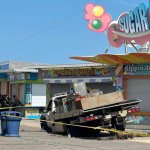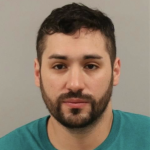CAPE MAY — Dr. Bill Weisberg has returned from two weeks in Haiti, an experience he calls “life changing.”
He treats a variety of illnesses and injuries at Cape Urgent Care but has never treated 600 people here in one day as he did as part of a medical team in Haiti.
Weisberg is the senior medical officer for New Jersey-One Disaster Medical Assistance Team, part of the National Disaster Medical System. Weisberg and the team also went to Mississippi after Hurricane Katrina and to Texas after Hurricane Ike.
The day after the earthquake, Weisberg met with his team in Atlanta, received immunizations and boarded a charter flight to Haiti. He is part of a 35-person team that includes several doctors, nurse practitioners, nurses, paramedics, pharmacists, a mental health worker and logistics persons.
Weisberg said the team normally travels with the equivalent of three box trucks of supplies.
“Theoretically, we could be dropped anywhere, set up a field hospital and be self sufficient for three days without re-supply,” he said.
The team arrived before its supplies were delivered. He said his group needed transportation from the airport to the American Embassy where a staging ground was set up.
“The only transport they could arrange was a dump truck, said Weisberg.
Shortly after arrival, he was called to an emergency mission for the U.S. Coast Guard. Hundreds of injured people were coming to a Haitian Coast Guard Base Medical Clinic that had been nearly destroyed by the earthquake.
Weisberg was flown from the embassy with two other team members in a Coast Guard helicopter to a cutter and then taken in a small boat to the clinic. He said he spent two days at the base and then joined a second medical team at the Petionville, a country club converted by the U.S. Army into a base to distribute food and water outside Port au Prince.
A large tent city was created housing 40,000 Haitians.
Weisberg was charged with setting up and staffing a field hospital in tents. Some patients arrived at the tent city on their own and volunteers brought others in on stretchers.
He said “strike teams” comprised of a paramedic, a nurse and a couple of helpers were sent to Port au Prince to identify the most severely injured and arrange to have them carried to the medical tents.
Weisberg did “outreach” missions with the Army traveling in Humvees into downtown Port au Prince looking for those who needed medical attention.
“We would go along the street and pass a sign that said ‘We Need Medical Help, Food, Water,’ we’d stop, find people and they would direct us through alleyways to find people on blankets… said Weisberg.
He worked as an emergency room physician for 20 years but said he never experienced anything like he saw in Haiti.
Weisberg said he saw “horrendous orthopedic injuries,” many with broken bones poking through skin and crush injuries involving tissue loss.
“Everything was infected within a couple of days, so you have horrendous open wounds, partial amputations to full amputations to bones going in different directions,” he said.
A few days after the earthquake, the team began seeing illness from persons living in close proximity with poor sanitation including severely dehydrated babies and pneumonia in babies and adults.
“Anyone who was in Haiti had to feel overwhelmed,” said Weisberg. “You had to ration care and ration supplies and that’s something we are not that used to.”
A problem for those with broken bones needing further orthopedic care such as pins, casts or surgery, there was no room for them in hospitals. Weisberg said no available medical facilities were a big problem for all sorts of injuries.
“People that would have been admitted to an intensive care unit, basically I was doing whatever I could do for them as far as splinting fractures, straightening out bent arms, giving them pain medicine and antibiotics and then giving them back to their families to take care of them and telling them to come back in a day or two…”
Weisberg called that experience “heartbreaking.”
His medical team of 35 combined with another medical team of 35 persons saw 600 injured Haitians on one day and had several other days of treating over 500 persons.
Weisberg said the Haitians were appreciative of the medical help they received. He said they have a tremendous pain threshold. He said he finds tremendous satisfaction in helping those who really need help. He said it is a good use of his medical training.
A highlight of his two weeks in Haiti was delivering two babies, he said. Weisberg’s medical team was set up 150 feet from a helicopter landing zone, where there were constant landings of choppers carrying supplies.
He said he recalls team members shielding the woman giving birth from the wind and dust of the helicopters.
Weisberg said he slept under the stars for 12 of his 14 days in Haiti. The team ate military “Meals Ready to Eat.”
“Nobody complained,” he said.








